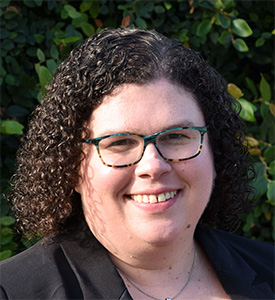Directory
Esther Brownsmith
Assistant Professor
Full-Time Faculty
College of Arts and Sciences: Religious Studies
Degrees
- Ph.D., Bible and Ancient Near East, Brandeis University, 2020
- MAR, Hebrew Bible, Yale Divinity School, 2009
- B.A. in Religion and Philosophy, Rice University, 2004
Profile
Esther Brownsmith is Assistant Professor of Hebrew Bible at the University of Dayton, having received her doctorate from Brandeis University and conducted postdoctoral research at M.F. Norwegian School of Theology, Religion and Society.
She is author of Gendered Violence in Biblical Narrative: The Devouring Metaphor, winner of an AJS Jordan Schnitzer First Book Publication Award, which is forthcoming in Routledge’s series “The Ancient Word.” She is editor-in-chief of the forthcoming Unruly Books: Rethinking Ancient and Academic Imaginations of Religious Texts, a collected volume emerging from the “Books Known Only by Title” international project. She is now working on a monograph on the book of Esther that reads it in the light of fan fiction studies, queer theory and affect theory.
Dr. Brownsmith’s research focuses especially on the stories of the Hebrew Bible and the cultural and literary norms that make them so resonant. In addition to her work on metaphor theory and gender, she conducts research on archives, archival loss and feelings about the past. She has been interviewed by the New York Times for her creation of “cuneiform cookies,” and she maintains an interest in the creative juxtaposition between ancient texts and “women’s arts” like crochet, cross-stitch and baking.
Professional activities
- Society of Biblical Literature
- Association for Jewish Studies
- Renewed Philology Affiliated Early Career Researcher
- Jewish-Christian Network of Young Scholars Salzburg
Research interests
- Hebrew Bible (Old Testament)
- Ancient Near East
- Metaphor studies and Conceptual Metaphor Theory
- Gender and queer theory
- Affect theory, embodiment and feelings about the past
- Fan fiction theory
- Biblical narrative
- Disability studies
- Metacriticism of biblical scholarship
Courses taught
- The Pentateuch
- Methods and Tools for Biblical Interpretation
- Gender, History and Theology
- Deborah: Judge, Prophet, Warrior and Mother in Ancient Israel
- Fan Fiction, Ancient and Modern
Selected publications
“A Jubilee of Fifty Books Known Only by Title” (primary author). Journal for the Study of the Pseudepigrapha 32.4 (2023), 376–398.
“‘Call Me By Your Name’: Critical Fabulation and the Woman of Judges 19.” Journal for Interdisciplinary Biblical Studies 4.2 (2022), 5–27.
“Getting Steamy in Amnon’s Chamber: Philological and Metaphorical Observations on 2 Samuel 13.” Vetus Testamentum 72.3 (2022), 355–385.
“To Serve Woman: Jezebel, Anat, and the Metaphor of Women as Food.” In Researching Metaphor in the Ancient Near East, edited by Marta Pallavidini and Ludovico Portuese. (Wiesbaden: Harrassowitz Verlag, 2020), 29-52.
“Mind the Gap: An Introduction to Biblical Philology, Gender, and the Two Mothers.” Hebrew Bible and Ancient Israel (HeBAI), vol. 8, 2019: 388-398.
Selected presentations
“Non-Binary Performances in Esther: How Stories Create Gender.” (Invited lecture at Uppsala University, 2023.)
“Transing Biblical Characters: Trans Lenses on Textual Interpretation.” (Organizer and round table participant at 2022 AJS annual conference.)
“Queering, Fearing, Persevering: Jewish and Queer Identity in Esther 8:17.” (SBL Annual Meeting, 2022.)
“For the Love of the Jews: The Book of Esther as Emotioned Literacy.” (European Association of Biblical Studies annual conference, 2022.)
“Absence and Yearning: Applying Affect Theory to Textual Gaps.” (“Lost, Yearned-for, and Unknown Books and Manuscripts” Conference, 2021.)
“Love and Eunuchs: Esther and Ishtar as Queer Queens.” (SBL Annual Meeting, 2021.)
“That’s What She (?) Said: Gendering Authorship and the Hebrew Bible.” (“Books Known Only by Title” webinar, 2021.)
